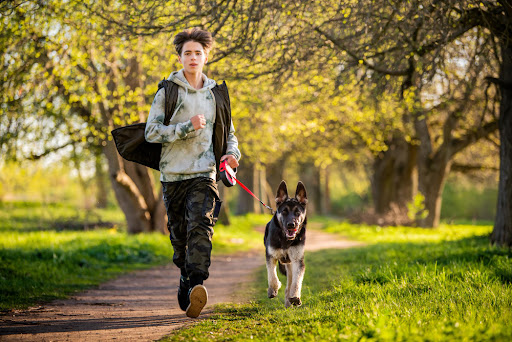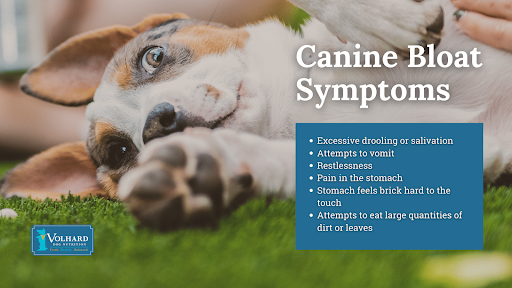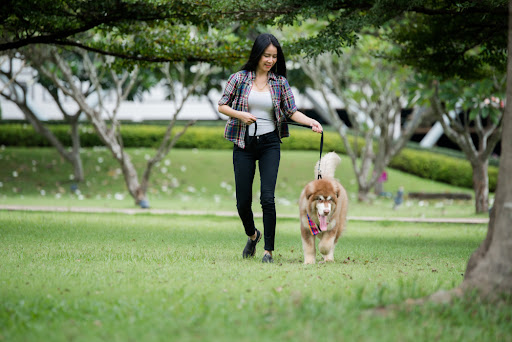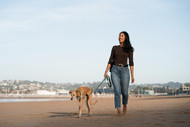Should I Feed My Dog Before or After a Walk?
Posted by Volhard Dog Nutrition on May 24th 2023
Going for a walk is always a great pleasure for both dogs and dog parents. It's the ideal bonding time for you and your dog, all while your four-legged partner burns off all that pent-up energy they've been saving throughout the day. Playing fetch, sniffing around, and chasing away the occasional squirrel (or squirrels!) will surely keep your dog happy and in tip-top shape.
If you’re a dog owner, you might have wondered about the best time to feed and walk your dog. Questions such as "Should I feed my dog before or after a walk?", "How long should I wait to walk my dog after eating?", "Can I walk my dog 30 minutes after eating?" and "Should I feed or walk my dog first in the morning?" may have crossed your mind.
Dog parents commonly worry that walking their dogs after eating could lead to bloating (also known as gastric dilatation-volvulus or stomach twists). But they’re also concerned that not fueling their dogs before a walk will leave them feeling weak, lethargic, and hungry.

How Early Should You Feed Your Dog Before a Walk?
If you're going to feed your dog pre-walk, it is recommended that you feed a smaller, not a large meal, at least half an hour before the walk. And if you're feeding a normal portion, you should wait at least an hour.
Feeding an hour or so before you walk means your dog will be energetic enough to enjoy their outdoor time with you while being safe from canine bloat.
What Is Canine Bloat?
Bloat gained its name from one of the most obvious symptoms of the illness. The canine stomach will usually bloat up and become distended as it fills with food and air.
Depending on the severity of the bloat, it can be fatal within a few hours if not treated properly, which is why it's so important to have a proper management plan in place when feeding your dog.
Bloat causes the stomach to swell, leading to injury if it pushes against other organs or the diaphragm.
Gastric dilatation and volvulus occurs when the stomach twists, escalating the seriousness and how quickly you need to get your dog to see the vet. The stomach twist injures the surrounding organs and makes it impossible for any food or gas to leave through the small intestines. In the most severe cases, a dog's stomach can rupture.
In more severe instances, the dilated stomach twists a full 180° in a movement called torsion. Such occurrences pose a high risk to the dog's life since both the digestive system's entrance and exit become blocked.
Surgery is imperative for correcting a gastric torsion. The spleen, which can be severely damagedduring bloating, may also be removed surgically. Treatment must be paired with careful nutritional management for optimal recovery.

In very early cases of bloat, you may not notice any swelling of the abdomen as signs can be quite subtle. Your dog becomes suddenly unsettled, they pace around, lie down but then immediately get back up again because even in its early stages, bloat is very uncomfortable and painful.
To ease the tension on their abdomen, your dog will pick more comfortable positions, such as lying with their front half down on the ground and their back legs still in a standing position. This way, they'll keep their stomachs from resting on the floor.
Progression of bloat and GDV can cause retching or dry heaving. As the food fails to pass through their stomach and the latter becomes increasingly uncomfortable, dogs will often try to be sick. If they vomit their food, it’s less likely to be a symptom of bloat or GDV; when suffering from these conditions, they’re more likely to vomit up bile as the food gets trapped in their increasingly painful stomach.
Dogs who are very uncomfortable around their abdomen may be sensitive to the touch, they might even guard their resting space against you if you try to approach, check on them, or pay attention to their stomach.
Other symptoms include drooling and panting (because they're distressed and unwell) and, of course, distention of the stomach. If you're able to touch their stomach, it will usually be hard and round as it's filled with air. Gently tapping on their stomach will also produce a more hollow noise than usual.
Even if you see the early signs and you’re still unsure, it's always safest to get them to see their vet as quickly as possible rather than letting the condition progress.
Dog Breeds Prone to Bloating
Large dog breeds and deep-chested dogs are more likely to experience bloating symptoms, such as excessive drooling or salivation, attempts to vomit, restlessness, and abdominal pain. A comprehensive list of dog breeds prone to experiencing canine bloat includes:
- Basset Hounds
- Boxers
- Doberman Pinschers
- German Shepherds
- Gordon and Irish Setters
- Great Danes
- Old English Sheepdogs
- Saint Bernards
- Standard Poodles
- Weimaraners
What Risk Factors are Associated With Canine Bloat?
Although the cause of GDV is yet to be ascertained, we know that canine bloat is diagnosed more often in large and deep-chested breeds, as well as in dogs who exercise right after mealtime or who are dealing with anxiety.
The type of food and the dog's age also come into play. It's been found that dogs who eat dry food or just a single daily meal can suffer from bloating when taking a walk too close to mealtime. Conversely, if their food is a mixture of dry and wet ingredients, the risk of bloat actually decreases.

Allow Your Dog's Stomach Enough Time to Fully Digest Food Before a Walk!
Putting together a walking/feeding schedule for your dog is a lot easier, now that you know that you can walk your dog either before or after mealtime! However, if your dog is already accustomed to enjoying their meal before walk time, keep doing so as long as the stomach has enough time to process the food. Otherwise, your dog will face bloat or other digestive troubles, putting their health at risk. For more advice on dog nutrition, health, and training, make sure that you contact us and check out our blog!
Volhard Dog Nutrition and its expert nutritionists are now offering online consultations to help more dog parents discover why, what, and how to feed their dogs the healthiest of foods! Speaking to a Volhard nutritionist will help you understand the inseparable relationship between healthy food, a healthy body, and a healthy mind. If you're interested in contacting one of our Volhard nutritionists, don't hesitate to access our consultation page!

